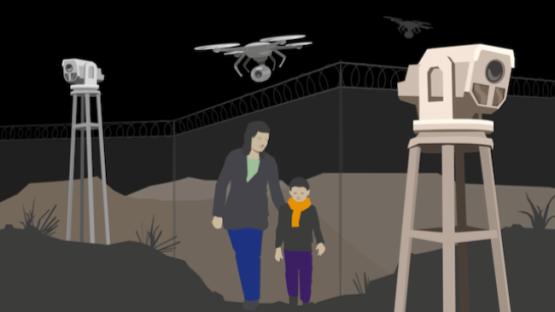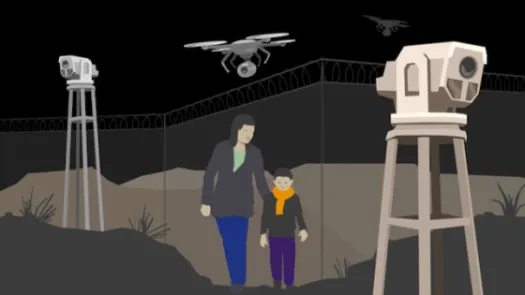
International Migrants Day 2023 - A Year in Review
On International Migrants Day, we reflect on wins and losses in the fight against violations of migrants’ rights.

18th December is International Migrants Day. It’s a day designated by the United Nations, dedicated to recognising the “important contribution of migrants while highlighting the challenges they face.”
On this day we wish to recognise in particular the countless human rights violations that people experience at borders and within hostile immigration systems. We thank those who survive these violations for sharing with us and others their experiences of such violations, and for accepting to undergo harsh litigation systems to bring authorities to justice. Without them PI and other organisations would never be able to develop useful and evidence-based advocacy against these inhumane practices.
We thereby take this day as an opportunity to highlight some of the fights that people and civil society everywhere have waged against states’ vindictive and harmful practices to “tackle” migration, and against those who profit from these.
AI in Migration & Border Control
This year (and in previous years) civil society has relentlessly fought for policy-makers to adopt a humane approach to immigration in various legislative initiatives. The #ProtectNotSurveil coalition, in particular, has consistently advocated for protections against harmful uses of Artificial Intelligence in border and immigration control. The final text of the EU AI Act was adopted by EU institutions on 8 December. A number of key protections made it to the final agreement thanks to all these efforts. But a lot of work remains, as EU Member States fought hard as well to retain their ability to abuse technology and data for surveillance and control of vulnerable populations.
GPS Tracking of Migrants
The UK government currently uses GPS ankle tags and fingerprint scanners to place migrants under 24/7 GPS surveillance. This has serious impacts on people’s lives, physical and mental health, and exercise of rights and freedoms.
In the last two months of 2023, we and others were in court twice to fight the cruel, unnecessary and vindictive GPS tagging policy. One led by Wilsons Solicitors, whose client argued that his tagging under immigration rules was a violation of his right to privacy, and that the government had no lawful authority to require people to wear broken tags (his tag has been malfunctioning for months), amounting to an undemocratic and arbitrary exercise of power. And another time led by Duncan Lewis Solicitors, who clients also argued that the imposition of GPS tracking and associated 24/7 surveillance is a violation of their right to private and family life under Article 8 of the European Convention on Human Rights.
To support all these efforts against this key hostile environment policy, which came from the United States and is now spreading to Australia, we performed research into the technical functioning and data collection of the GPS tags, as well as research into the private companies that profit from the UK’s harmful policy. As part of this work we’ve beenre also calling out Capita, the private company outsourced to deliver the UK government’s GPS tagging policy, and encouraging anyone to write to them to echo our concerns.
Meanwhile, the UN Human Rights Committee (HRC) concluded its review of the United States’ compliance with the International Covenant on Civil and Political Rights (ICCPR). In its Concluding Observations, the HRC recommended that the US should “ensure that immigration detention is used only as a measure of last resort and for the shortest possible period of time, and increase the use of alternatives to detention that are respectful of human rights, including the right to privacy, instead of surveillance-based technological alternatives.” Statements by the HRC are carefully made and influential, hence may be of significant use to future advocacy against this and other migration policies deployed with complete disregard for human rights and dignity.
Monstrous Databases
All these systems of surveillance and control wouldn’t be complete without gigantic databases to collect, merge, analyse and interpret the data they produce - and use resulting “insights” to justify further violence, rejection or humiliation. This year again, the race to expand databases of migrants’ and refugees’ personal data has accelerated.
The Border Violence Monitoring Network (BVMN) carried out in-depth, essential research into the growth of the “Balkandac”, the digital systems of biometric data collection in the Western Balkans. These are modelled off the EU’s EURODAC system, allowing for seamless interoperability in the future.
Meanwhile, the EU is proposing to expand EURODAC, its database for registering asylum seekers who enter the EU. Civil society, again, has been active in calling out the proposed reform for its blurring of immigration and criminal law purposes, its lack of anti-discrimination safeguards, and its bypassing of key data protection principles. To better understand the key issue of EU databases interoperability, Statewatch maintains an incredibly useful map of interoperable immigration and policing databases.
Digital Borders
This year we also saw a welcomed a clear growing interest from international human rights monitoring bodies in challenging to challenge harmful uses of technology and data in migration and border control and to hold governments to account.
First, the UN Secretary General (UNSG) prepared a critical report on the human rights of migrants, having sought input specifically from civil society organisations working at the intersection of technology and human rights. Covering many aspects of human rights issues in migration management, the UNSG noted with concern that “States and non-State actors are increasingly using digital technology in their border
governance infrastructure”, and drew on submissions by PI and Access Now for evidence of resulting harms.
Second, the UN Office of the High Commissioner for Human Rights (OHCHR) published a comprehensive study into Digital Border Governance, calling for a human-rights based approach to the use of digital technologies at borders. The study acknowledges the work of civil society, academia and international organisations that shaped research, analysis and advocacy in this field. Amongst others, it highlights concerns with surveillance-based alternatives to immigration detention (“GPS tagging”), exploitation of migrants’ biometric data, and border externalisation.
In a year, we hope to write this post with news that some of these harmful systems have been abandoned. None of that will happen without all the efforts made by civil society to challenge them. Nor will they happen without those who are subjected to them.
Click here to find out more about our work in this domain and sign up to our mailing list to follow our work.



